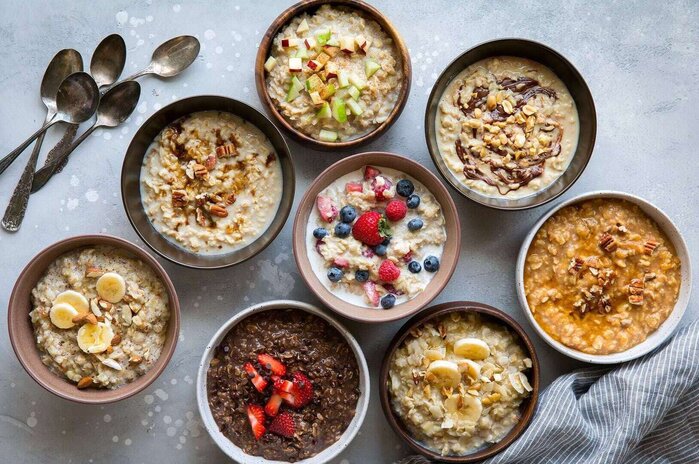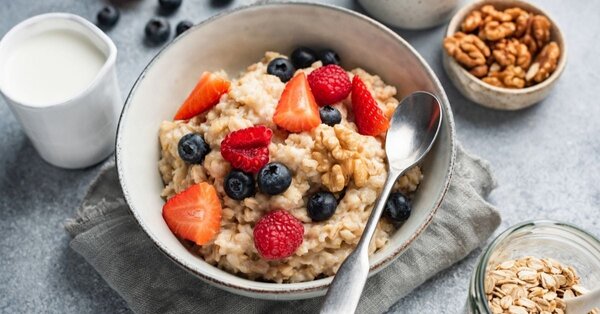Oatmeal Nutrition: Understanding the Facts About Calories, Protein, Fat, Carbs, and Vitamins
Oatmeal is a popular breakfast food that is known for its numerous health benefits. It is a rich source of nutrients and has a low glycemic index, making it an ideal choice for people who want to maintain their blood sugar levels. In this article, we will discuss the nutrition facts of oatmeal, including calories, protein, fat, carbs, and vitamins.
Calories in Oatmeal - How Many Calories In Oatmeal

A serving of oatmeal (approximately 40 grams) contains about 150 calories. This makes it an ideal breakfast food for people who are looking to lose weight, as it provides a filling and nutritious meal without adding too many calories to their daily intake.
Role of Calories in Weight Management
Calories are essential for the body as they provide energy to perform daily activities. However, consuming too many calories can lead to weight gain, while consuming too few calories can lead to weight loss. To maintain a healthy weight, it is essential to consume the right amount of calories that the body needs. Oatmeal is a low-calorie food that can help in weight management.
Protein in Oatmeal - How Much Protein In Oatmeal
A serving of oatmeal contains approximately 6 grams of protein. While this may not seem like a lot, it is still a significant source of protein, especially for vegetarians and vegans who may struggle to consume enough protein in their diet.
Importance of Protein for the Body
Protein is essential for the body as it helps in building and repairing tissues, making enzymes and hormones, and supporting the immune system. Consuming enough protein is especially important for people who are physically active, as it helps in repairing muscle damage and promoting muscle growth.
Fat in Oatmeal
Oatmeal is a low-fat food that contains healthy fats, including monounsaturated and polyunsaturated fats. These types of fats are beneficial for the body as they can help in reducing the risk of heart disease and improving overall health.
One serving of oatmeal contains approximately 2 grams of fat, which is primarily in the form of unsaturated fats. These healthy fats can help in reducing inflammation in the body and supporting brain function.
Types of Fat in Oatmeal
Oatmeal contains both saturated and unsaturated fats. Saturated fats are known to increase the risk of heart disease, while unsaturated fats are known to have heart-healthy benefits.
Health Benefits of Consuming Healthy Fats

Consuming healthy fats, such as monounsaturated and polyunsaturated fats, can help in reducing the risk of heart disease, stroke, and diabetes. These fats also help in lowering bad cholesterol levels in the blood and increasing good cholesterol levels.
Carbohydrates in Oatmeal - How Many Carbohydrates In Oatmeal
Oatmeal is a great source of carbohydrates, providing a slow and steady release of energy throughout the day. One serving of oatmeal (1/2 cup dry) contains approximately 27 grams of carbohydrates.
Types of Carbohydrates in Oatmeal
Oatmeal contains both simple and complex carbohydrates. Simple carbohydrates, such as sugar, are quickly absorbed by the body and provide a quick source of energy, while complex carbohydrates, such as fiber, take longer to digest and provide a sustained source of energy.
Role of Carbohydrates in the Body
Carbohydrates are essential for the body as they provide energy to perform daily activities. They also help in regulating blood sugar levels and supporting brain function. Fiber, which is a type of complex carbohydrate, is especially important for digestive health and can help in reducing the risk of chronic diseases such as heart disease and cancer.
Vitamins and Minerals in Oatmeal
Oatmeal is a good source of several vitamins and minerals that are essential for maintaining good health. Here are some of the key vitamins and minerals found in oatmeal:
Magnesium: One serving of oatmeal (1/2 cup dry) contains approximately 64 milligrams of magnesium, which is important for maintaining healthy bones, muscles, and nerves.
Phosphorus: Oatmeal is also a good source of phosphorus, with one serving providing about 180 milligrams. Phosphorus is important for maintaining healthy bones and teeth, as well as for energy production and cell function.
Vitamin B1 (Thiamin): Oatmeal contains small amounts of thiamin, with one serving providing about 0.2 milligrams. Thiamin is important for maintaining healthy nerves and energy production.
Iron: Oatmeal contains small amounts of iron, with one serving providing about 1.5 milligrams. Iron is important for maintaining healthy blood cells and preventing anemia.
Zinc: One serving of oatmeal contains about 1.2 milligrams of zinc, which is important for supporting a healthy immune system and wound healing.
Vitamin B6: Oatmeal contains small amounts of vitamin B6, with one serving providing about 0.1 milligrams. Vitamin B6 is important for maintaining healthy brain function and energy production.
Vitamins In Oatmeal
Oatmeal is a good source of vitamins such as thiamine, riboflavin, niacin, and vitamin B6. These vitamins play an important role in energy metabolism and the functioning of the nervous system.
Importance of Vitamins for the Body
Vitamins are essential for the body as they help in maintaining good health and preventing chronic diseases. They also play a role in supporting the immune system and aiding in the absorption of other nutrients such as iron and calcium.
Health Benefits of Oatmeal Nutrition
Reduced Risk of Chronic Diseases
Consuming oatmeal on a regular basis has been shown to reduce the risk of chronic diseases such as heart disease, diabetes, and some types of cancer. This is due to the high content of fiber, antioxidants, and other nutrients present in oatmeal.
Improved Digestion
Oatmeal is a good source of fiber, which can help in improving digestion and reducing the risk of digestive problems such as constipation and bloating.
Boosted Immune System
Oatmeal contains vitamins and minerals that play an important role in supporting the immune system. Consuming oatmeal on a regular basis can help in strengthening the immune system and reducing the risk of infections.
Easy Ways To Get Oatmeal In Your Diet
There are numerous recipes that can be made using oatmeal, including oatmeal cookies, granola bars, and oatmeal pancakes. Oatmeal can also be added to smoothies, yogurt, and oatmeal bowls for a nutritious and filling breakfast.
How To Enhance Oatmeal Nutritional Value
To enhance the nutritional value of oatmeal, it can be topped with fruits, nuts, and seeds. Adding a source of protein, such as Greek yogurt or nuts, can also help in making the meal more filling and satisfying.
Is Oatmeal Good For You
Oatmeal is a nutritious and filling breakfast food that is rich in calories, protein, healthy fats, carbohydrates, and vitamins. Consuming oatmeal on a regular basis can provide numerous health benefits, including reduced risk of chronic diseases, improved digestion, and boosted immune system. There are numerous ways to include oatmeal in your diet, and with the right toppings and additions, it can be a delicious and satisfying meal.